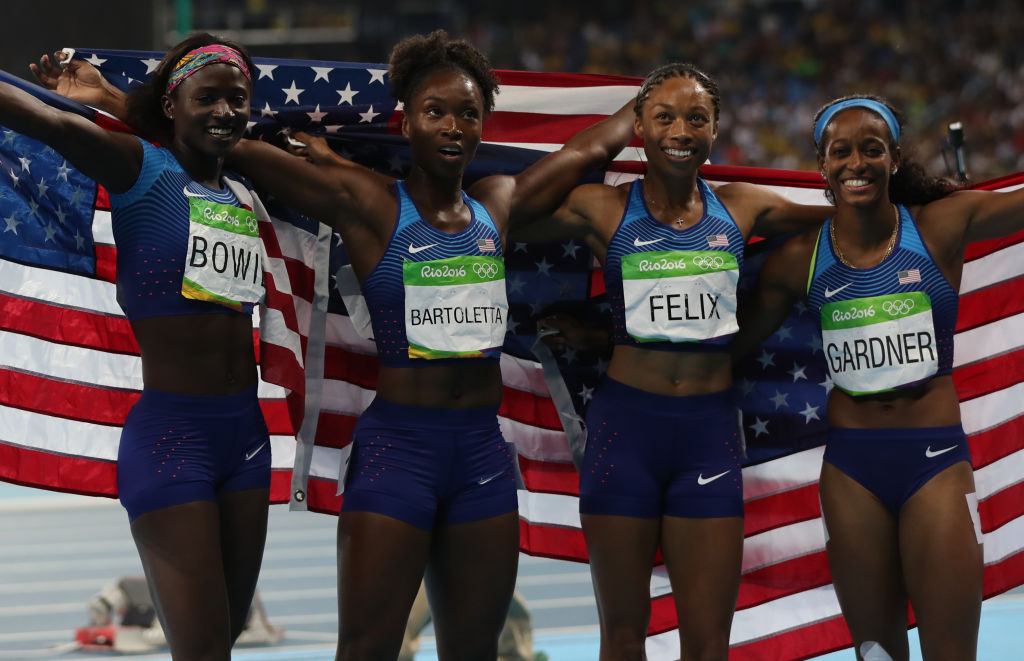Allyson Felix Talks Tori Bowie, ‘Black Women Giving Birth’

[ad_1]

From right to left: English Gardner, Allyson Felix, Tianna Bartoletta and Tori Bowie of the United States celebrate winning gold in the Women’s 4 x 100m Relay Final on Day 14 of the Rio 2016 Olympic Games at the Olympic Stadium on August 19, 2016 in Rio de Janeiro, Brazil. | Source: Ian MacNicol / Getty
Decorated U.S. Olympian and maternal health advocate Allyson Felix opened up about the death of her former teammate Tori Bowie during a televised interview on Sunday morning.
The track star appeared on NBC’s “Meet the Press” and addressed Bowie’s pregnancy-involved death last year, her own struggles during childbirth and the overall topic of Black maternal health.
MORE: Maternal Death Rates Have More Than Doubled For Black Women, New Study Finds
Felix recalled her own experience of being compelled to “hide” her pregnancy from her main sponsor Nike because of contractual reasons, calling it “a really isolating and lonely time, instead of a really – a time that we could celebrate.”
That tragic-turned-triumphant experience is in part what helped Felix become an advocate for maternal health, a topic she discussed and contextualized with her teammates’ complicated pregnancies as well as Bowie’s death in May of this year from complications from childbirth. Bowie was about eight months pregnant with a developed fetus when she was found dead, according to an autopsy.
Officials have speculated that Bowie’s death could have been brought on by a condition called eclampsia, which is defined by the Mayo Clinic as “a complication of pregnancy” that “usually begins after 20 weeks of pregnancy in women whose blood pressure had previously been in the standard range.” Notably, it can be deadly if left untreated.
Felix — with severe preeclampsia — gave birth to her son in 2018 after having to undergo an emergency C-section at 32 weeks. The life-threatening experience changed her life completely and now Felix looks to help others become aware of the maternity mortality crisis Black women face.
“This condition does not discriminate. It doesn’t matter if you have the – the best medical care. You can still suffer from it. And to me, it just really hurts my heart that my friend, Tori, passed away, and it brought this back to the forefront,” Fleix said. “But this has been happening, you know? This is the reality of Black women giving birth in America. And there are so many situations that are like this. And so I hate that it takes such a – a devastating loss, you know, to bring it back to the forefront. But it also is just such a motivation that, you know, we have to do better.”
According to the Centers for Disease Control (CDC), Black women dominate the maternal mortality rate with “significantly higher than rates for White and Hispanic women,” citing statistics from 2021. The disparity has nothing to do with education or socio-economic levels.
“Black women face disrespect, abuse, and mistreatment in facility-based settings like hospitals, at a much higher rate than other people of color, particularly, more so than white women,” Breana Lipscomb, senior advisor for Maternal Health & Rights at the Center for Reproductive Rights, told NewsOne in an interview last year. “We have to make sure that they are receiving safe and respectful care when they walk into a hospital.”
Click here to watch the full “Meet the Press” interview with Allyson Felix.
SEE ALSO:
Lawsuits Against Program Helping Black Women Survive Childbirth Reveals Pro-White Agenda
[ad_2]
Source link

